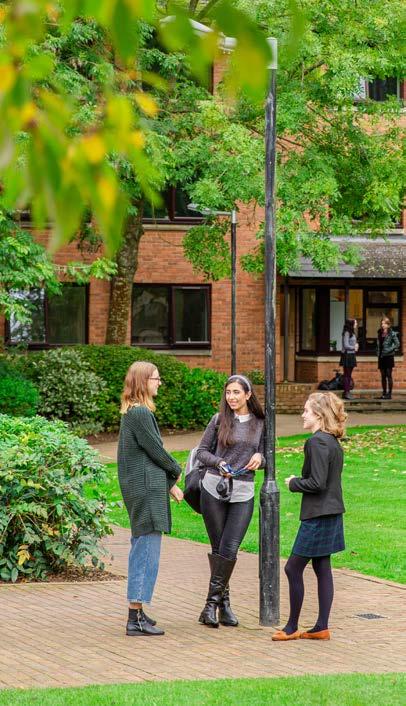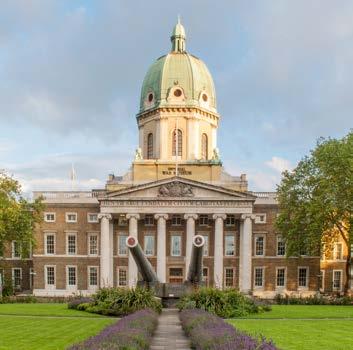Security Intelligence Studies



How do we assess the terrorist or hostile state threat in the early 21st century?
How effective is our intelligence machinery to counter this threat? How should this be balanced with other preventative measures?
What are the key geopolitical threats to the West likely to be in the next 5 to 10 years?
What are the benefits of covert action to support a state’s foreign policy aims?
How can covert investigatory practice offer competitive advantage over our adversaries?
These are the questions the Buckingham’s Centre for Security and Intelligence Studies (BUCSIS) explores and debates, drawing on a wealth of academic, operational and policy experience.

The Centre offers students innovative courses in intelligence, and security, incorporating strong practice orientated content. The aim, to help students develop strong analytical skills and a knowledge base to international levels of excellent.
BUCSIS was established in 2008 as a world class centre for research into key security and intelligence issues facing the UK and the world in the 21st century.
The research team have a wealth of experience of working in the UK Government on defence and security policy issues, strategic security and foreign policy, and covert investigatory policy and practice.
The BUCSIS advisory board fosters close links with practitioners as well as with industry in the field of intelligence management.
Innovative courses in intelligence, covert activity and security studies.
Campus Buckingham
Two-year degree (three-years with Foundation)
Available start dates January, September
This programme provides a broad-reaching foundation of understanding concerning the interaction between technology, politics, and security in the 21st century. It covers the contemporary security and intelligence environment in western democracies, with a focus on the United Kingdom.
The programme is aimed not only at providing a sound level of understanding of the key debates and theories in the fields of technology, politics and security, but also at preparing students for a career in strategy and policy making at the higher levels of government and security institutions.
A core curriculum in the political and social underpinnings of contemporary international relations and security studies is supplemented with two optional tracks: the first concerns diplomatic, foreign and security, while the second provides a management-view understanding of the core cyber technologies of the contemporary era and the policy implications of cyber security strategies at the highest levels.
Those choosing the BA Security and Intelligence and Cyber with the integrated foundation will embark on a three-year programme, the first year of which offers an introduction into the Security, Intelligence and Cyber landscape, ideal for candidates that need extra preparation before studying at undergraduate level.
The foundation course is structured to bridge the gap between any current qualifications and experience you have, and the start of undergraduate study.

• Foundations of Global Security
• Foundations of Intelligence Organisations and Structures
• Cyber Challenges
• National Security in a Cyber Age
• Development and Security
• Terrorism and Counter Terrorism
• Integrated Industry Experience
• Companion to Industry Experience
• Conflict, Crisis and Strategic Decision-Making
• Intelligence threats, triumphs, and blunders
• Diplomacy in the Modern Age
• Media, Society, Security and Cyberspace
• Global Security and International Law

• Research Design and Methods
• Security, Intelligence and PolicyMaking
• Network Analysis for Criminal Investigators
• International Relations: Theories and Concepts
• DNA and Crime
• US Foreign Policy in the Post Cold War Era
• Dissertation
• Introduction to Political Theory
For the most upto-date course information, visit our website - just scan the QR code.
Campus Buckingham
ELCAS approved
Available start dates January, September
This course provides a deep understanding of the contemporary security and intelligence environment in western democracies, with a focus on the United Kingdom.

Security and intelligence studies are an important new field in political science but there is also widespread recognition that a good knowledge of how security and intelligence agencies operate; of the environment in which they operate; and of how their products are, and should be, used has become a key component of good and successful governance.
Emphasis is placed on relating academic and historical analysis to contemporary problems and policy questions especially in the UK but also to western states in general, using a unique degree of practitioner-led expertise.

The course focusses on the skills that the intelligence community itself has been urged to develop in the wake of the Butler Review on Intelligence on WMD and subsequent intelligence related inquires. The Butler report specifically recommended the development of a greater degree of ‘professionalisation’ in intelligence analysis skills, including critical thinking and analysis (developed in part through an element of exercising and collaborative working on challenge problems), and a greater ability to evaluate and assess disparate sources of sometimes conflicting information.
This programme is aimed at anyone who is interested in intelligence and security issues, whatever their career plans, but also at those who may be aspiring to work in the field of security and intelligence. It can also assist the career development of those already employed within that field.
• Intelligence Tradecraft and Machinery
• Terrorism and Counterterrorism: Practice and Policy

• Analytical Simulation Exercises
• Case Studies in Intelligence Success and Failure
• Current Threats: External and Internal
• Intelligence and International Security since 1939
• Dissertation
For the most upto-date course information, visit our website - just scan the QR code.
Campus Buckingham
ELCAS approved
Available start dates January, September
The MA Security, Intelligence and Diplomacy combines elements from our MA Security and Intelligence with a suite of diplomacy modules.
The modules are taught intensively in lectures, seminars and small group tutorials; they assume little prior knowledge but rapidly bring students to an advanced level of understanding.
As with all our MA course, it helps prepare graduates for careers in foreign and other ministries, international organisations, international journalism and global civil society organisations, or for further research. The course is also suitable for those without a specific career aim in mind but who wish to acquire and indepth knowledge of these subjects.

• Diplomacy
• International Law and Diplomacy
• Foreign Policy Analysis
• Security Challenges and other Global Issues
• Intelligence Tradecraft and Machinery
• Case Studies in Intelligence Success and Failure
• Intelligence and International Security since 1939
• Dissertation
For the most upto-date course information, visit our website - just scan the QR code.
Campus Online Available start dates January, September

ELCAS approved
To survive, states require effective intelligence collection and covert action capabilities, yet both attract significant controversy. This online course will critically and systematically analyse aspects of these capabilities and the attendant practices that are designed to mitigate threats to the state.

The programme will explore the state’s use of covert action as a way of limiting or avoiding war, stifling the hostile intentions of enemies, and assisting in progressing the aims of foreign policy. It covers the types of covert action historically deployed by states, from propaganda to political violence to paramilitary action.
Good intelligence can address threat ambiguity. It can assist policymakers in making hard choices in complex and dynamic circumstances. Intelligence can provide clarity over the nature of an adversary’s threat and inform the selection of the most appropriate operational or strategic response.
Accordingly, this course will also explore the use of an established collection discipline, that of human intelligence (HUMINT). It will examine the application of HUMINT in both national security and serious crime operating environments and also the tradecraft associated with the elicitation of human intelligence.
The course will undertake a scientific approach to the understanding of how and

why people are willing to cooperate with the state in terms of the provision of human intelligence. It will investigate the evidence base for techniques adopted to elicit intelligence that aim to maximise the volume and quality of intelligence, interviewee recall and accuracy and the avoidance of deception and deceit.
MODULES
• Covert Action
• Human Intelligence
• Psychology of Intelligence Elicitation
For the most upto-date course information, visit our website - just scan the QR code.
Campus Online Available start dates January, September
ELCAS approved
This entirely online programme offers insight into closed and sensitive areas of security and intelligence practice within both western democracies and authoritarian regimes.
Emphasis is placed on relating academic and historical analysIs to contemporary problems and policy questions, especially in the UK, but also to western states in general, using a unique degree of practitioner-led expertise.
This programme enables students to choose (with guidance) their own topic of research and to pursue this under expert one-to-one supervision.
The MA by Research combines engaging pre-recorded seminars with a focus on one’s own research project.
This programme is aimed at anyone who is interested in intelligence and security issues and also those who may be aspiring to work in the field of security and intelligence. It can also assist the career development of those already employed within that field. Assessment is via a 25,000-word research dissertation.

SEMINARS
• Covert Action
• Human Intelligence
• Psychology of Intelligence Elicitation
• Research methods and techniques
• Dissertation
For the most upto-date course information, visit our website - just scan the QR code.
Attendance Full-time / Part-time
BUCSIS has a vibrant course of active research in a range of security and intelligence issues, involving both the UK and overseas students. We offer research degrees both at master’s level and PhD level.

We offer two levels of postgraduate study, in either full-time or part-time. These are degrees by research which require an original contribution to the body of knowledge in a particular academic or professional discipline.
• Master’s– two academic years of full-time study or four years of part-time study.
• PhD – three academic years of full-time study or six years part-time study. Postgraduate students wishing to register for a PhD must first register for the Master’s and seek conversion at a later stage.
PhD students will undertake supervised but independent research, at the end of which they submit a thesis embodying he results of that research. The thesis must demonstrate familiarity with, and an understanding of the subject, its principal sources and authorities. It should display critical discrimination and a sense of proportion in evaluating evidence and judgements of others.
A PhD thesis must embody an original contribution to the knowledge of the discipline either by the discovery of new knowledge, or by the exercise of a new and independent critical approach.
Applicants need:
• A first or second class honours degree (or equivalent) from a recognised university; or appropriate professional experience in the subject area.
• A good command of the English language, both written and oral (IELTS 6.5 or equivalent)
For the most upto-date course information, visit our website - just scan the QR code.
You can develop your ideas and passions in a truly supportive environment at Buckingham. Our academic open-door policy ensures you can access your lecturers at a time that works for you; and we keep class sizes small, so you get the attention you need to succeed in your studies.

Every student at Buckingham is assigned a personal tutor: these are members of our academic staff who recognise the challenges of working with traumatised and complex populations and who are here to support you from the day you start to the day you complete your course. They are there to offer guidance and advice to ensure your studies are a success. Group-reflective sessions are also offered as part of this course.
Our Wellbeing, Skills and Diversity Team offer personalised support to any student who may be having problems with University life or their mental or physical health.
We offer hefty fee discounts to many postgraduate students. These include a 33 per cent discount if you have a first-class honours degree recognised to UK standard; or a 25 per cent discount for Buckingham graduates with a 2:1 undergraduate degree progressing on to a postgraduate course. PhD discounts are also available.


We welcome serving and retired armed services personnel as a recognised ELC approved training provider (Provider ID 1460). Service leavers can claim ELC for up to five years after leaving the armed services. Find out more at www. enhancedlearningcredits.com.
We offer a varied programme of extra-curricular opportunities including guest speaker events, visits to relevant historical sites, internships and networking opportunities with members of the intelligence communities.



Knowledge is of two kinds. We know a subject ourselves, or we know where we can find information upon it.”
Samuel Johnson 1709-1784